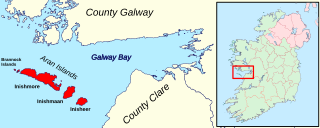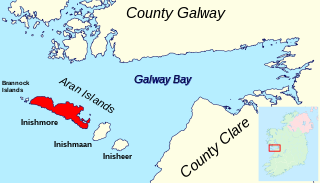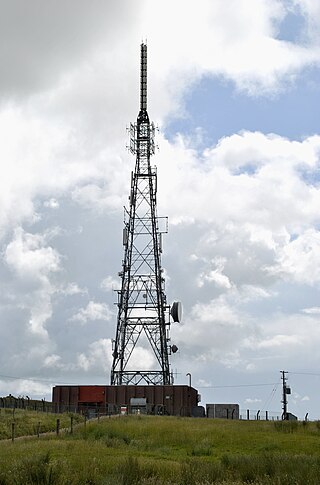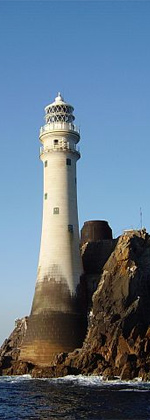
The Aran Islands or The Arans are a group of three islands at the mouth of Galway Bay, off the west coast of Ireland, with a total area around 46 km2 (18 sq mi). They constitute the historic barony of Aran in County Galway.
RTÉ Radio 1 is an Irish national radio station owned and operated by RTÉ and is the direct descendant of Dublin radio station 2RN, which began broadcasting on a regular basis on 1 January 1926.

The Rosses is a traditional 'district' in the west of County Donegal in Ulster, the northern province in Ireland. The Rosses has a population of over 7,000 centred on the town of Dungloe, which acts as the educational, shopping and civic centre for the area. Defined by physical boundaries in the form of rivers, as well as history and language use, the area has a distinctive identity, separate from the rest of County Donegal. The extensive district lies between the parish and district of Gweedore to the north and the town of Glenties to the south. A large part of the Rosses is in the Gaeltacht, which means that Irish is the spoken language. The Rosses, Cloughaneely and Gweedore, known locally as "the three parishes", with 16,000 Irish speakers, together form a social and cultural region different from the rest of the county, with Gweedore serving as the main centre for socialising and industry. Gaeltacht an Láir is another Irish-speaking area.

Inishmore is the largest of the Aran Islands in Galway Bay, off the west coast of Ireland. With an area of 31 km2 (12 sq mi) and a population of 820, it is the second-largest island off the Irish coast and most populous of the Aran Islands.

2RN is the trading name of RTÉ Transmission Network DAC, a wholly owned subsidiary of Raidió Teilifís Éireann, formerly trading as RTÉNL, which runs Ireland's principal digital terrestrial television and radio broadcast networks. In December 2002 it became an incorporated company and subsidiary of RTÉ; it was previously a division within RTÉ. It operates 12 main TV and radio transmitter sites and many smaller relays and transposers, which carry television and/or radio. It also provides site hosting for mobile telephone operators, the emergency services, wireless broadband and other private mobile communications service providers.

Mount Leinster is a 794-metre-high (2,605 ft) mountain in the Republic of Ireland. It straddles the border between Counties Carlow and Wexford, in the province of Leinster. It is the fifth-highest mountain in Leinster after Lugnaquilla 925 metres (3,035 ft), Mullaghcleevaun 849 metres (2,785 ft), Tonelagee 817 metres (2,680 ft), and Cloghernagh 800 metres (2,600 ft), and the highest of the Blackstairs Mountains. A 2RN transmission site tops the peak with a mast height of 122 metres (400 ft).

An Leadhb Gharbh is a Gaeltacht village on Arranmore Island, which is to the west of County Donegal about three miles from Burtonport. The island's post office, secondary school and ferry port are located in Leabgarrow. Leabgarrow also hosts a cafe and numerous pubs and bars.

Loch an Iúir, anglicised as Loughanure, is a village and townland in The Rosses, a district in the west of County Donegal in Ulster, the northern province in Ireland. The village is in the Gaeltacht, being halfway between Gweedore and Dungloe, with the N56 road passing through the village. According to the 2016 census, 37% of the population spoke Irish on a daily basis outside the education system. The village of Loughanure lies within the Barony of Boylagh.

RTÉ Radio is a division and service of Raidió Teilifís Éireann (RTÉ), which broadcasts four analogue channels and five digital channels across Ireland and beyond.
Saorview is the national digital terrestrial television (DTT) service in Ireland. It is owned by RTÉ and operated by 2RN.
Saorsat is a free-to-air satellite service in Ireland. The service launched on 3 May 2012. It was designed to provide TV service to a final 1-2% of the Irish population unable to receive other signals.

MV Clew Bay Queen is a car ferry at Clare Island. Built in 1972 as MV Kilbrannan for Caledonian MacBrayne, she operated mainly at Scalpay, Outer Hebrides until 1992. As Arainn Mhor, she then operated the Arranmore ferry in County Donegal.

The Holywell Hill transmission site is located on a 260 metre hill near Killea in County Donegal, Ireland, and is owned and operated by 2RN.

The Spur Hill transmission site is located to the south of the city of Cork, Ireland, just north west of Cork airport, on a hill with a 137 metre elevation.

The Wild Atlantic Way is a tourism trail on the west coast, and on parts of the north and south coasts, of Ireland. The 2,500 km driving route passes through nine counties and three provinces, stretching from County Donegal's Inishowen Peninsula in Ulster to Kinsale, County Cork, in Munster, on the Celtic Sea coast.
SS Stolwijk, a Dutch cargo ship of 2,489 tons, was wrecked off the coast of County Donegal, Ireland on 6 December 1940. She was part of a Convoy SC 13 sailing from the Dominion of Newfoundland to Liverpool, England, when her rudder was damaged in a fierce storm. Attempts to rescue her by her destroyer escort failed and she went on the rocks off Tory Island, County Donegal, Ireland. Ten of her crew were lost but the remaining 18 were rescued the following day by Arranmore Lifeboat and landed safely in Burtonport. The rescue of the survivors was conducted in terrible weather conditions and both the RNLI and Queen Wilhelmina of the Netherlands awarded medals to the Irish lifeboat crew.

Inishcoo is a small island and a townland off the coast of County Donegal, Ireland. The closest town on the mainland is Burtonport.
This is a timeline of RTÉ Radio.
Róise Mhic Ghrianna was a traditional Irish-language singer and storyteller.
Arranmore Lifeboat Station is at Poolawaddy, a hamlet on the eastern coast of Arranmore Island, approximately 2 miles (3.2 km) north of Leabgarrow, the islands largest settlement. Arranmore, or Aran Island, is located in County Donegal, on the north west coast of Ireland.






















